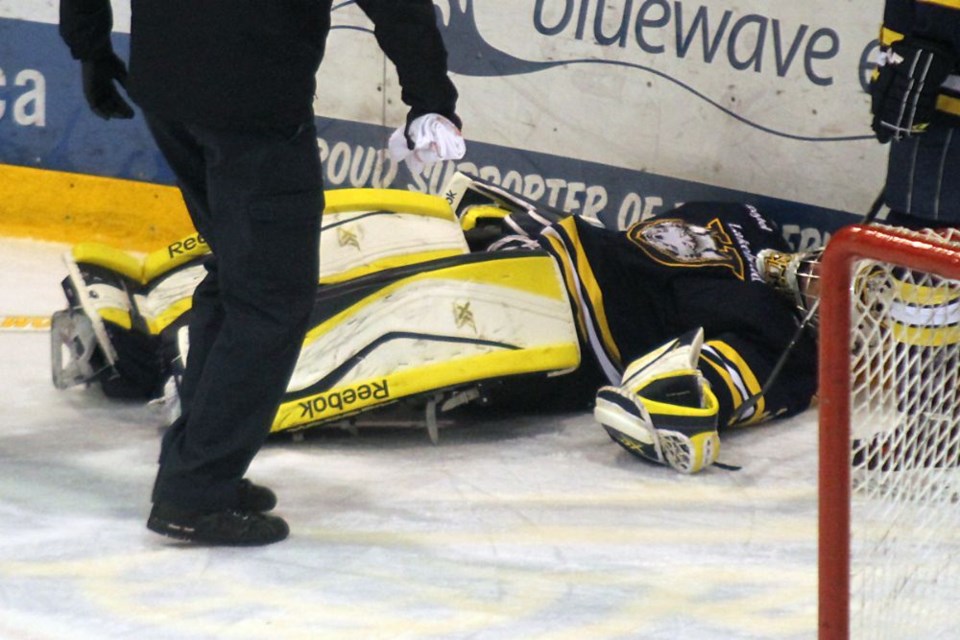Physician David McKee says he’s not surprised a recent study shows most hockey helmets don’t really do the trick when it comes to preventing concussions.
McKee, who runs the Lakehead concussion clinic, said the helmets are actually designed to prevent serious head injuries. But according to the study, conducted at Virginia Tech, the vast majority of the 32 hockey helmets tested, 25 in fact, failed to earn even a two-star rating, which equates to an adequate status. Only one helmet, the Warrior Kron 360, landed a three-star rating.
Half earned one star and nine got zero stars.
The author of the report said they weren’t out to get helmet manufacturers. They’re looking to improve the game.
Each helmet model was tested 48 timesand overall more than 2,000 impacts tests were conducted, both on the ice and in a laboratory setting.
“Our focus is to improve the safety of the sport, and we have spent a great deal of time developing the methods and relaying these to the manufacturers so that they can optimize their designs,” said Stefan Duma, head of the university’s department of biometrical engineering and mechancs, in a release.
“Our hope is to see new helmets come into the market with improved performance.”
McKee, who has treated several Thunderwolves hockey players for concussions recently, notably goaltender Jeff Bosch who missed a chunk of last season after hitting his head on the Fort William Gardens ice, said the results should be a warning to parents and athletes alike.
But it's not just about what an athlete is wearing on his or her head.
“I think that concussion will always be a part of risk-taking endeavours and sport is one of those. For sure I think there are a number of methods and efforts we can implement to help reduce concussions, such as fair play and rules of game and head hits that are happening,” McKee said.
“If we can eliminate a fair bit of that, then I think we can help out.”
There will never be hockey without the risk of concussion, he cautioned.
The sport has has come under particular scrutiny in recent years
Future hall-of-famer and Dryden native Chris Pronger had his career cut short in November 2011, when he was hit in the face by Toronto’s Mikhail Grabovski.
Would-be hall-of-famer Eric Lindros had his career interrupted by concussions, and NHL leading scorer Sidney Crosby has been told if he suffers another concussion he should likely retire. The symptoms also forced former Boston Bruins star Marc Savard permanently to the sidelines, and the NHL failed last week in its bid to have a class-action lawsuit filed by former players seeking damages from concussion-related injuries
McKee agreed that many players think putting a helmet on makes them invincible.
Not true, he said.
"Putting a helmet on makes you think you’re safe and you can play hockey without risk or ski down the hill at 80 kilometres an hour without risk. But that is not the case. They do help in the prevention of serious injuries, but they do not prevent concussion.”
The Virginia Tech study, which not surprisingly has met with some criticism from helmet manufacturers, showed that a helmet’s price was a poor indicator of a helmet’s level of protection.
McKee said it’s important for parents and coaches to recognize the severity of head injuries and not take chances.
There’s a proper protocol to follow, and while the competitor in most athletes compels them to jump back into the play, just because they don’t feel like their bell was rung after a hard hit doesn’t mean they haven’t suffered a concussion, mild or otherwise.
They affect people in different ways, McKee said.
“I know it’s hard, but it’s the recommendation to stay out of your game and don’t get back while you still have symptoms,” he said.
McKee added he believes manufacturers can make design improvements that will lessen the likelihood of a concussion.



